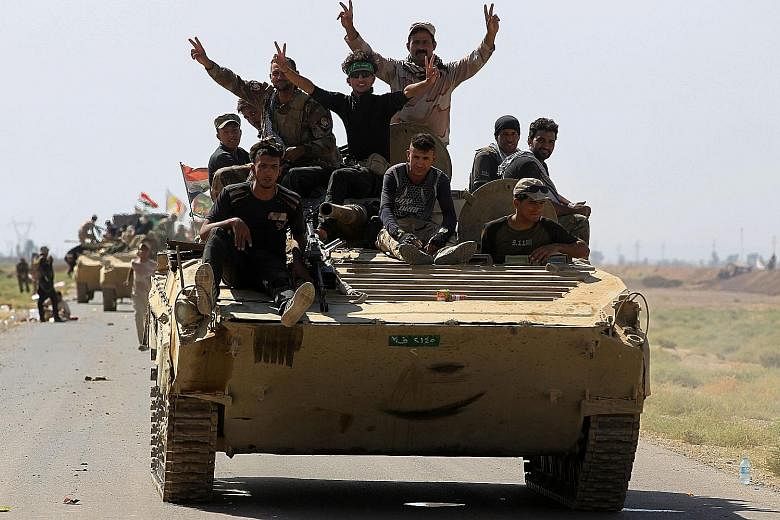BAGHDAD • The Iraqi government has dismissed a call from US Secretary of State Rex Tillerson for Iranian-backed paramilitary units that helped Baghdad defeat ISIS to end operations in Iraq.
Speaking after a meeting on Sunday with Iraqi Prime Minister Haider al-Abadi and Saudi Arabia's King Salman, Mr Tillerson said it was time for the Iraqi Popular Mobilisation Forces and their Iranian advisers to "go home".
Washington is concerned that Iran, a Shi'ite regional power, will take advantage of gains against the Islamic State in Iraq and Syria to expand the influence it gained after the US invasion in 2003, something Sunni Arab rivals such as Riyadh also oppose.
"Iranian militias that are in Iraq, now that the fight against ISIS is coming to a close, those militias need to go home. The foreign fighters in Iraq need to go home and allow the Iraqi people to regain control," Mr Tillerson said at a joint news conference with Saudi Foreign Minister Adel Jubeir.
A senior US official indicated that Mr Tillerson was referring to the Iranian-backed Popular Mobilisation Forces and the al-Quds Force of the Islamic Revolutionary Guard Corps.
But Mr Abadi yesterday showed unwillingness to meet Mr Tillerson's demand.
"No party has the right to interfere in Iraqi matters," a statement from his office read. It did not cite the Prime Minister himself but a "source" close to him.
Trained and armed by Iran, the Iraqi Popular Mobilisation Forces often supported Iraqi government units in the fight against the militants who were effectively defeated in July when a US-backed offensive captured Mosul, their stronghold.
They are paid by the Iraqi government and officially report to the Prime Minister, but some Arab Sunni and Kurdish politicians describe these militias as a de facto branch of the Iranian Revolutionary Guards Corp.
Iraq's Sunni neighbours, including Saudi Arabia, share Washington's concerns over Shi'ite power Iran's influence in Iraq, where the population is also predominantly Shi'ite.
But the office of Mr Abadi, who is himself a Shi'ite, said the forces were under the authority of the Iraqi government.
"Popular Mobilisation are Iraqi patriots," it said in the statement.
The United States trained tens of thousands of Iraqi soldiers in the course of rebuilding the Iraqi armed forces and has over 5,000 troops deployed in the country, providing key air and ground support to the offensive on ISIS.
In Teheran yesterday, President Hassan Rouhani said Iran's position in the Middle East had never been stronger, without responding directly respond to Mr Tillerson's comments on Sunday. "The greatness of the nation of Iran in the region is more than at any other time," Mr Rouhani said in a speech carried by the state broadcaster.
"In Iraq, Syria, Lebanon, northern Africa, in the Persian Gulf region - where can action be taken without Iran?"
But despite its powerful position in the region, Mr Rouhani said Iran's regime was under threat from fierce infighting between conservatives and moderates at home.
"We should not think that damaging one part of the system will strengthen the other part. No, the whole system will collapse," he warned.
REUTERS, AGENCE FRANCE-PRESSE

